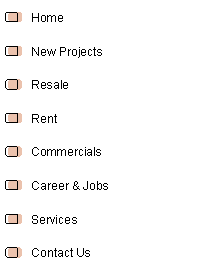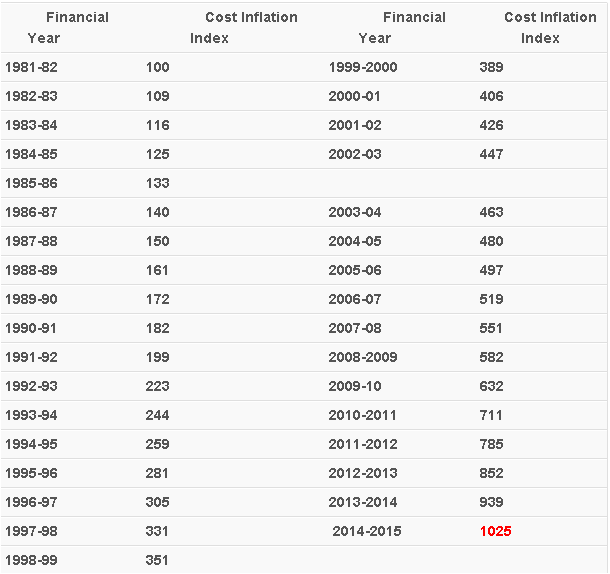
|
(Article written by Praeep Singh, Director Square Meters - December, 2015)
Capital Gain Tax Structure The income tax rules define gain in two broad categories; namely short term capital gain (STCG) and long term capital gain (LTCG). If investors buy and sell assets within 3 years, this comes under short term capital gain. If investors buy real estate, keep it for more than 3 years and sell, it comes under long term capital gain.
Short Term Capital Gain: For Short term capital gain, the gain from asset is added to the investor’s income and taxed as per the income slab they fall under. For example, if an investor falls under the tax slab of 30%, the gain will also be taxed at the rate of 30%.
Long Term Capital Gain: For Long term capital gain, tax calculation involves what is known as indexation. The acquisition cost or cost of acquiring the asset is recalculated based on indexation. Indexation is a concept, which factors inflation in its calculation by using a factor called cost inflation index (CII). The cost inflation index number is published every year by Reserve Bank of India (RBI) and people can use it to find out the taxable gain on the transaction. The gain will also be taxed at the rate of 20%.
A note about Indexation Suppose you bought 2 acres of land today at the rate of Rs 5 lakhs per acre. This means your purchase price is Rs 10 lakhs. After 5 years, the price goes up to Rs 7 lakhs per acre. If you sell at the end of next 5 years, you will receive 14 lakhs. The holding period return will be 40% or 4 lakhs (Rs 14 lakhs - Rs 10 lakhs). The question is should you pay taxes on the returns of 4 lakhs. The answer is no. The price of property will not be considered as Rs 10 lakhs while calculating the gain. It will be taken as more than Rs 10 lakhs by using CII. Hence the investor will have to pay taxes on an amount less than 4 lakhs. Let’s see an example. Example Rahul bought 10 acres of land at Rs. 3 lakhs per acre on 30th Jan, 2000. He paid 30 lakhs for the property. Case 1: He sold the property on 30th Apr, 2002 at the rate of Rs 4 lakhs per acre. This means he sold it at Rs 40 lakhs and before 3 years. Hence, short term capital gains will be applicable. In this case, there will be no indexation benefit and Rahul will have to pay tax on the gain which is 10 lakhs (40 lakhs - 30 lakhs). The gain of 10 lakhs will be added to his regular income and will be taxed as per the tax slab he falls into.
Case 2: He sold the property on 10th Jan, 2004 at the rate of 4.2 lakhs per acre. This means he received Rs 42 lakhs. Moreover, since this is done after 3 years, the gain will be taxed by factoring indexation. Hence the investor will not pay tax on Rs 12 lakhs (Rs 42 lakhs - Rs 30 lakhs) but an amount lesser than 12 lakhs. In this case, let’s take a look at the CII numbers. Numbers for other years which are not relevant to us have been skipped.
Now to calculate long term capital gain, the acquisition price will not be taken as Rs 30 lakhs, a new figure will be considered, this is also known as indexed cost of acquisition, which factors in CII. The new price of acquisition = Initial price * (CII for the year sold / CII for the year bought) This will give 30 lakhs * (463 / 389) = 35.71 lakhs.
The capital gain will be Rs 42 lakhs - Rs 35.71 lakhs = 6.29 lakhs. This is the amount on which the investor has to pay taxes at the rate of 20%. This means the investor will have to pay an amount of 20% of 6.29 lakhs = 1.25 lakhs.
[A Property of Rs. 10 Lacs Purchased in 2010 will be considered of Rs. (10 Lacs x 1025/ 711) in 2014 which is Rs. 144163.15. If he sell it in 14.41 Lacs, there will be no tax but if he sale it above 14.41 Lacs he has to pay tax on it and it will be considered as a Capital Gain]
Note: Investors can deduct any other cost spent on the improvement of the property. This will take tax liability further down. You can also calculate indexed cost of improvement to take it further down.
The sale of a property involves short-term capital gains tax if you sale property before the completion of three years of purchase.
If the property was sold after three years of its purchase having elapsed, long-term capital gains tax as per indexation becomes applicable.
The gains from this asset is added to the investor's income and taxed as per the income slab he falls under. For example, if an investor falls under the tax slab of 30 percent, the gain will also be taxed at the rate of 30 percent. The tax on this type of gain is not eligible to any type of exemptions.
When it comes to long-term capital gains, which occurs when you sell a house after a period of three years, tax calculation involves what is known as indexation. The acquisition cost of the asset is recalculated based on indexation, which factors inflation in its calculation by using the Cost Inflation Index.
Note: Expenses on Transfer, Brokerage Charges, Registration Charges, Stamp Duty, Transfer Charges cannot be claimed as an income tax.
SAVING TAX
Buy a house: Houses are a popular investment option. Long-term capital gains from selling a house get tax exemption if they are invested in buying or building a new house. The new house has to be bought one year before the transfer of the first house Or within two years after the sale. The deduction allowed is equal to the actual investment or the capital gain, whichever is lower.
"One can buy an under construction apartment to save capital gains tax, provided its construction is completed within three years of the transfer of the first property,"
The Income Tax Act exempts the capital gains from the sale of a house if you invests the gains in a residential property within two years from the date of sale or constructs another house within three years from the date of sale. This means, you cannot invest in a commercial property or land to save tax - you have to necessarily buy residential property only. If the property is under construction, the two-year period is further enhanced to three years.
BANK ACCOUNTS:
Under section 54 the seller of the property can claim for tax exemption; to avail the benefits seller must use entire profit (capital gain) to buy another house. The seller has two options, (i) either he can buy another house within two year from sale of property else he can build a house in three years. (2) Buyer can also buy a house 1 year prior to selling the house and still can avail the benefit under section 54. If after selling property, seller has not identified the property yet. The seller has to open a special account i.e. capital gain accounting scheme. All the withdrawal from this account should be made only for purchase of property. However if seller failed to buy a property within three years after selling property the whole amount will exposed to LTCG (Short Term Capital Gain).
|

|
Greater Noida Properties |

|
Follow us on Twitter & Facebook to get all Property Updates |




